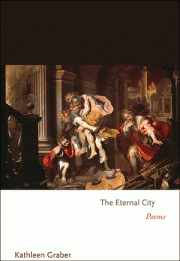The Eternal City by Kathleen Graber
The Eternal City
By Kathleen Graber
Princeton University Press
Kathleen Graber’s aptly titled second collection of poetry, The Eternal City, questions the reality and logic of what it means to communicate with the past, present, and future. From the first poem until the last she is in conversation with “the eternal,” but more specifically with human interaction and thinking that jumps back and forth on an infinite timeline. This trope is one of the most successful, and intriguing, threads throughout her book. Many of her poems are ekphrastic, responding to specific works of art; other poems use epigraphs, in which case Graber directly speaks with, and answers to, the author of the quote. The poems “Dead Man” and “Fitzcarraldo” are responses to Jim Jarmusch’s film and Werner Herzog’s film, respectively. The title poem, “Eternal City,” was inspired by a Joseph Brodsky essay, while “Three Poems for Walter Benjamin” and “Some Great Desire” are in conversation with an essay of Benjamin’s. Examples of poems with epigraphs are numerous, including “The Third Day,” which is in conversation with a quote from Genesis, and multiple poems that employ the haikus of Kobayashi Issa. The entire second section (of three) of Graber’s book draws on quotes from Marcus Aurelius to add structure to the series of twelve poems. The underlying success here is that Graber takes unrelated texts and persons and intricately weaves them together with forceful language and aesthetic resonance.
Recently in the New York Times Book Review, critic David Orr criticized the extensive use of citation in contemporary poetry. Orr argues that present-day poets attempt to look smart by padding their poetry with the words of canonical writers who already possess fame and respect. Not so in Graber’s case. While a few distinct moments of disconnect arise between the body of a poem and its epigraph (for instance, the last poem begins with a haiku from Issa, “How did it go / The Festival at Nikko? / O Cuckoo,” but Graber never alludes to the quotation), her keen diction and imagery provide a sufficient base for the reader, regardless of whether that same reader even knows who Walter Benjamin or Marcus Aurelius was. It may help to look these people up in order to contextualize Graber’s use of their work (Benjamin was a literary critic, Aurelius a Roman emperor and philosopher), but ultimately this extra step is unnecessary to enjoy her poems. For example, in the previously mentioned poem, the opening is a wonderful combination of imagery and philosophic ponderings: “Sometimes we are asked to prove who we are. / Just this morning at the library I had to open / my passport & ask a stranger to vouch for me / so that I could take home a book. If you live / long enough, you realize that you are not / the person you were.”
Graber is greatly concerned with this notion of “not being who you once were,” and this can be seen in one of the first poems, “Florum Principi”: “And if I’m feeling blue, it’s because I’ve been looking / all morning at the old photos I’ve promised to send to my brother, / who has a new son & can, therefore, stare into the untended past / & not be bent. /. . . Because you (Linnaeus) knew two words were enough / to separate chickweed from mallow, I want to talk to you about the soul / & the question of when we become irrefutably ourselves . . .” Here again Graber expertly connects human emotion to history: Linnaeus, who laid the foundation of binomial nomenclature (taxonomy), is asked a biological question that even he could not answer, yet Graber finds merit in asking his perspective, in having a conversation with the early 1700s to attempt an answer. Graber frequently uses snippets of her narrator/persona’s life, in which she states that most of her family has died, to merge questions about loss and reinvention with something greater than herself, and the present, by probing different facets of temporal existence to shape an “eternal city.” She imagines that “the Eternal City/ . . . is like a gigantic old brain, one that’s grown / a little weary of the world.” She urges the reader to “Tolle! Lege!” (“take up and read” in Latin) in order to understand that via conversation comes connection to this shared knowledge, allowing us to hold “something both whole and wholly shattered.”

